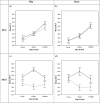Effectiveness of psychological support in patients undergoing primary total hip or knee arthroplasty: a controlled cohort study
- PMID: 26220315
- PMCID: PMC4882293
- DOI: 10.1007/s10195-015-0368-5
Effectiveness of psychological support in patients undergoing primary total hip or knee arthroplasty: a controlled cohort study
Abstract
Background: We hypothesised that psychological support would have a significant improvement on the mental and physical recovery of patients undergoing primary total hip or knee arthroplasty.
Materials and methods: 200 patients were consecutively alternately assigned (1:1) to receive routine care (control group) or, in addition, psychological support from a professional psychologist (experimental group). The psychological support was provided at the pre-operative visit, during the hospitalisation period and at the rehabilitation centre.
Results: Upon discharge, based on the 'Hospital Anxiety and Depression Scale, a state of anxiety was observed in 12.8 % and 78.9 % of the patients in the experimental and in the control group, respectively (p < 0.0001). A state of depression was observed in 12.8 % and 73.7 % of the patients in the experimental and in the control group, respectively (p < 0.0001). With regard to the 'Physical Component Scale' of the SF-36 questionnaire, a similar temporal trend of values was observed in the two study groups, significantly increasing over time in both groups, taking into consideration both the joint population and the two hip and knee populations separately (p < 0.0001). With regard to the 'Mental Component Scale' of the SF-36 questionnaire, in both the joint population and the two hip and knee populations separately, an exact opposite temporal trend was observed in the experimental group compared to the control group (p < 0.0001), with generally higher scores in the experimental group (p < 0.0001). In patients with hip arthroplasty, the average time to reach the physiotherapy objective (i.e., the patient ability to walk 50 metres independently and to climb 10 steps) was 6.7 ± 1.8 days (range 4-12) in the experimental group and 7.9 ± 2.2 days (range 0-13) in the control group (p = 0.0015).
Conclusions: In summary, there was a lower incidence of anxiety and depression and better mental well-being in the group of patients who received the psychological support. Within the hip arthroplasty group, the patients who received the psychological support reached the physiotherapy objective 1.2 days earlier than the patients in the control group (p = 0.0015).
Level of evidence: Level 3, Non-randomized prospective controlled cohort.
Keywords: Depression scale; Hip arthroplasty; Hospital anxiety; Knee arthroplasty; Psychological support; SF-36.
Figures

Similar articles
-
Anxiety and depressive symptoms before and after total hip and knee arthroplasty: a prospective multicentre study.Osteoarthritis Cartilage. 2013 Dec;21(12):1834-40. doi: 10.1016/j.joca.2013.08.022. Epub 2013 Sep 4. Osteoarthritis Cartilage. 2013. PMID: 24012622
-
Psychosocial predictors for outcome after total joint arthroplasty: a prospective comparison of hip and knee arthroplasty.BMC Musculoskelet Disord. 2018 May 22;19(1):159. doi: 10.1186/s12891-018-2058-y. BMC Musculoskelet Disord. 2018. PMID: 29788969 Free PMC article.
-
Does pre-operative anxiety and/or depression affect patient outcome after primary knee replacement arthroplasty?Knee. 2018 Dec;25(6):1238-1246. doi: 10.1016/j.knee.2018.07.011. Epub 2018 Aug 16. Knee. 2018. PMID: 30121151
-
Fulfilment of knowledge expectations among family members of patients undergoing arthroplasty: a European perspective.Scand J Caring Sci. 2015 Dec;29(4):615-24. doi: 10.1111/scs.12199. Epub 2015 Feb 4. Scand J Caring Sci. 2015. PMID: 25648518 Review.
-
Preparing patients for hip and knee replacement surgery.Nurs Stand. 2007 Sep 19-25;22(2):50-6; quiz 58. doi: 10.7748/ns2007.09.22.2.50.c4618. Nurs Stand. 2007. PMID: 17944139 Review.
Cited by
-
Association of serotonin transporter-linked polymorphic region (5-HTTLPR) with heat pain stimulation and postoperative pain in gastric cancer patients.Mol Pain. 2021 Jan-Dec;17:17448069211006606. doi: 10.1177/17448069211006606. Mol Pain. 2021. PMID: 33882731 Free PMC article.
-
The influence of perioperative interventions targeting psychological distress on clinical outcome after total knee arthroplasty.Rheumatol Int. 2020 Dec;40(12):1961-1986. doi: 10.1007/s00296-020-04644-y. Epub 2020 Jul 29. Rheumatol Int. 2020. PMID: 32728837 Free PMC article.
-
Effect of functional relaxation on the quality of life in patients with periprosthetic joint infection: Protocol for a randomised controlled trial.BMJ Open. 2022 Oct 17;12(10):e066066. doi: 10.1136/bmjopen-2022-066066. BMJ Open. 2022. PMID: 36253042 Free PMC article.
-
Outpatient Total Joint Arthroplasty.Curr Rev Musculoskelet Med. 2017 Dec;10(4):567-574. doi: 10.1007/s12178-017-9451-2. Curr Rev Musculoskelet Med. 2017. PMID: 29064004 Free PMC article. Review.
-
A Culturally Adapted Perioperative Mental Health Intervention for Older Black Surgical Patients.Am J Geriatr Psychiatry. 2024 Nov;32(11):1341-1357. doi: 10.1016/j.jagp.2024.06.001. Epub 2024 Jun 11. Am J Geriatr Psychiatry. 2024. PMID: 38942694
References
Publication types
MeSH terms
LinkOut - more resources
Full Text Sources
Other Literature Sources
Medical
Research Materials

